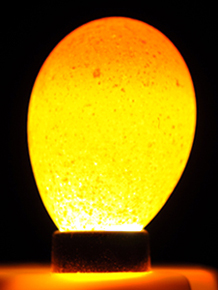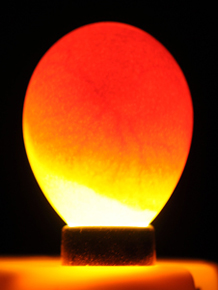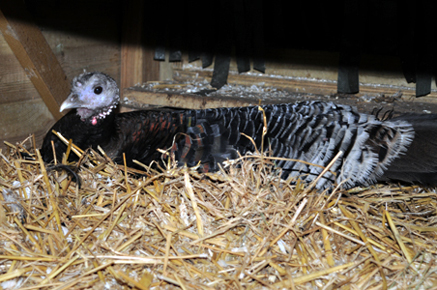Welcome to Relaxed Farming
- Alpacas
- Chickens
- Dairy Goats
- Ducks
- Geese
- Pigs
- Pygmy Goats
- Quail
- Rabbits
- Sheep
- Turkeys
- Polytunnel
- Photo Stories
- Video Stories
- Food
- Smallholding Map
- 2013
- 2014


- August
- September
- October
- November
- December
- January
- February
- March
- April
- May
- June
- July
- August


- 1
- 2
- 3
- 4
- 5
- 6
- 7
- 8
- 9
- 10
- 11
- 12
- 13
- 14
- 15
- 16
- 17
- 18
- 19
- 20
- 21
- 22
- 23
- 24
- 25
- 26
- 27
- 28
- 29
- 30
- 31
Monday, 7th April 2014
Our turkey eggs have been in the incubator for eight days and as they are now just over a quarter of the way through their incubation period, tonight was a great time to candle them and see how many are fertile. Candling means to shine a bright light through the eggs in order to spot the developing embryo. It is called candling because... you've guessed it... people used to use candles to help them look. Nowadays we have special candling torches where the egg sits on top of the light source and so shines up through it. It needs to be done in a dark room so that the only source of light comes from the candler itself.
In the photos below the egg on the left is NOT fertile and the one on the right is. Can you see the difference? The key sign to look for in a fertile egg is the spider's web of red blood vessels coming from the centre. Somewhere in the middle you can often see a dark 'blob': that is the eye of the bird. The heart of the bird is now developed and if you look closely enough you will often see actual movement.
Amazingly EIGHTEEN out of our 20 eggs are fertile which is a great rate!! However, there is a long way to go and lots can go wrong. Some developing embryos die in the early stages of development, some go on to become fully formed chicks but then die before they hatch and unfortunately with turkeys, the losses once they have actually hatched can be quite high as well.
Baby turkeys are vulnerable creatures: something we will look at in more detail later. One reason for the fertile eggs NOT to turn into healthy chicks is the presence of germs and bad bacteria. If these get into the developing egg (which they can do quite easily as egg shells are porous and so air and water can get in), the embryo really has no way of fighting them: a good reason for keeping your incubator as clean as you can (and washing your hands any time you handle the eggs).
Meanwhile over in the poultry area the turkeys have continued to lay lots of eggs and we have been amazed as all three girls (Katherine, Victoria and Camilla) have been laying for four, or even five days in a row. Today we realised why, two of them Victoria (pictured) and Camilla have gone broody. They were obviously laying like mad to get a good clutch together. Our next task is to work out what to now do with them: we don't need any more turkeys hatching and the eggs we now have may no longer have the potential to be fertile anyway (see 26th March). Plus , our experience to date suggests turkeys don't actually make good mums!! We will, as ever, keep you posted!!


